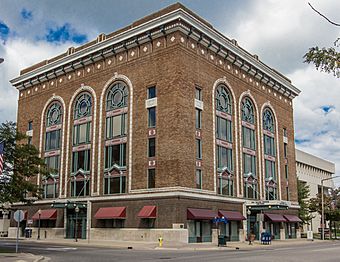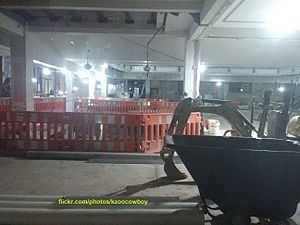Masonic Temple Building (Kalamazoo, Michigan) facts for kids
Quick facts for kids |
|
|
Masonic Temple Building
|
|
 |
|
| Location | 309 N. Rose St., Kalamazoo, Michigan |
|---|---|
| Area | 0.3 acres (0.12 ha) |
| Built | 1913 |
| Architect | Spier & Rohns |
| Architectural style | Italian Renaissance |
| NRHP reference No. | 80001876 |
| Added to NRHP | May 12, 1980 |
The Masonic Temple in Kalamazoo, Michigan is a very old and important building. It was built in 1913. This building was added to a special list called the National Register of Historic Places in 1980. This list helps protect buildings that are important to history. Today, no Masonic groups meet in this building anymore.
Contents
History of the Masonic Temple Building
A group called Masonic Lodge No. 22 started in Kalamazoo in 1848. At first, they met in different temporary places. In 1852, they set up a meeting hall in a building downtown.
Why a New Building Was Needed
By 1868, their meeting room was too small for the growing group. So, the Masons decided to build their own place, which they called the Masonic Hall. But by the early 1900s, even this building was getting old.
Eleven different local Masonic groups decided to work together. They wanted to build a bigger, newer place. This new building is the Masonic Temple Building we see today. They hired architects named Spier & Rohns to design the plans. Construction on the new building began in 1913 and was finished in 1915.
What Happened to the Building Later
The Temple was used by the local Masonic community for almost 50 years. It was also a place for public events in Kalamazoo. However, by 1963, it became too expensive to keep up the large building.
The Masons built a new, smaller building and sold the 1913 Temple. There were plans to turn it into office spaces, but this did not happen. In 1975, Kalamazoo County bought the building. They later sold it again, and the building was renamed the "Rose Street Market." The building was sold once more in 2015.
As of 2019, the building was empty. There were plans to turn it into a hotel. In 2020, a Hilton Garden Inn hotel opened on the site.
What the Building Looks Like
The Kalamazoo Masonic Temple Building is a large, six-story building. It has a flat roof and is shaped like a square. Each side of the building is about 100 feet long.
The sides of the building that face the street are covered with brown bricks. The other two sides are covered with yellow bricks. The main parts of the building have special molded decorations. These decorations are made of terra cotta, which is a type of baked clay.
These terra cotta decorations are shaped like horseshoes. Inside each horseshoe shape are four round-headed windows. Strips of terra cotta connect these decorations. A metal border, called a cornice, runs along the very top of the building.




